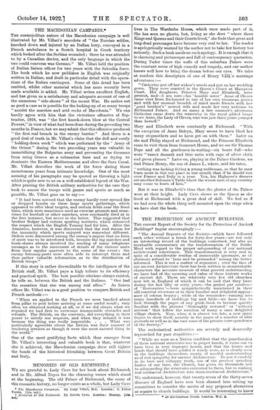THI, MACEDONIAN CAMPAIGN.*
Ting cosmopolitan nature of the Macedonian campaign is well illustrated by Mr. Villari's anecdote of " the Russian soldier, knocked down and injured by an Italian lorry, conveyed in a French ambulance to a Scotch hospital in Greek territory which looked after the Serbian wounded ; there he was attended to by a Canadian doctor, and the only language in which the two could converse was German." Mr. Villari held the position of Italian liaison officer for two years with the Salonika force. The book which he now publishes in English was originally written in Italian, and dealt in particular detail with the opera- tions of the Italian contingent. Some of this detail has been omitted, whilst other material which has more recently been made available is added. Mr. Villari writes excellent English, and has given us a satisfactory and adequate account of one of the numerous " side-shows " of the recent War. He makes out as good a case as is possible for the locking-up of so many troops " amidst the marshes and arid rocks of Macedonia." We can hardly agree with him that the victorious offensive of Sep- tember, 1918, was " the first knock-down blow at the Central Powers," in view of what had been done during the preceding two months in France, but we may admit that this offensive produced " the first real breach in the enemy barrier." And there is a good deal of truth in Mr. Villari's claim that the dull and costly " holding-down work " which was performed by the " Army of the Orient " during the two preceding years was valuable in immobilizing the Bulgarian army and preventing the Germans from using Greece as a submarine base- and so trying to dominate the Eastern Mediterranean and close the Suez Canal. Mr. Villari describes the work of the force during those monotonous years from intimate knowledge. One of the most amusing of his paragraphs may be quoted as throwing a light which is quite new to us on a well-established legend of the War. After praising the British military authorities for the care they took to amuse the troops with games and sports as much as possible, Mr. Villari goes on to say:— "It had been noticed that the enemy hardly ever opened fire or dropped bombs on these large sports gatherings, which appeared to offer ideal targets, and certain fields near the front lines, which were sometimes used as exercise grounds and some- times for football or other matches, were constantly fired at in the first instance, but never in the latter. This suggested that brother Bulger had certain sporting instincts, which enhanced the respect which the English Tommy had for him. After the Armistice, however, it was discovered that the real reason for the immunity which sports enjoyed was somewhat different. Orders were discovered among the enemy's papers that no form of sport was to be interfered with, because the big matches and horse-shows always involved the sending of many telephone messages as to the movement of details of the various units from their regular quarters to the scene of the event ; the enemy listening-posts were often able to intercept them and thus gather valuable information as to the distribution of British troops."
If this story is rather discreditable to the intelligence of the British staff, Mr. Villari pays a high tribute to its efficiency and practical spirit. The best possible relations always existed, he tells us, between the British and the Italians. " One had the sensation that dire was among real allies." As liaison officer Mr. Villari was in a good position to compare British and French methods :-
"When we applied to the French we were bandied about from pillar to post before arriving at some useful result ; very often we obtained nothing at all, or if we did obtain what we required we had first to overcome innumerable obstacles and refusals. The British, on the contrary, did everything in their power to satisfy our requests, and when they refused it was because the thing was really impossible. . . . What was particularly agreeable about the British was their manner of rendering services as though it were the most natural thing in the world."
One of the most gratifying facts which thus emerges from Mr. Villari's interesting and valuable book is that, whatever else it achieved, the Macedonian campaign drew still tighter the bonds of the historical friendship between Great Britain and Italy.


































 Previous page
Previous page